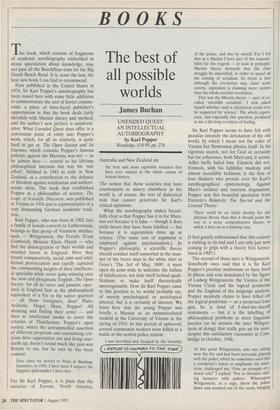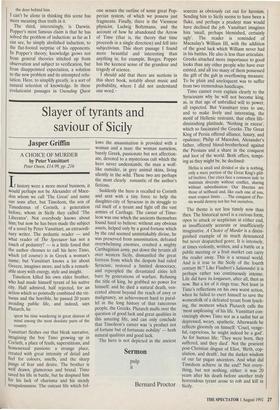BOOKS
The best of all possible worlds
James Buchan
This book, which consists of fragments of academic autobiography embedded in dense speculation about knowledge, may not pass all the Burchillian tests for the Big Dumb Beach Read. It is, none the less, the best new book I can find to recommend.
First published in the United States in 1974, Sir Karl Popper's autobiography has been issued here with some little additions to commemorate the end of Soviet commu- nism: a piece of bare-faced publisher's opportunism in that the book deals fairly sketchily with Marxist theory and method, and the author's new preface is uninform- ative. What Unended Quest does offer is a convenient point of entry into Popper's work, which, for all its celebrity, is quite hard to get at. The Open Society and Its Enemies, which contains Popper's famous polemic against the Marxists, was not — as he admits here — central to his lifetime philosophical interests but was his 'war effort', finished in 1943 in exile in New Zealand, as a contribution to the defence of freedom against totalitarian and authori- tarian ideas. The book that established Popper as a philosopher of science, The Logic of Scientific Discovery, was published in Vienna in 1934 and is representative of a very demanding German academic tradi- tion.
Karl Popper, who was born in 1902 into a family of Jewish converts to Lutheranism, belongs to that group of Viennese intellec- tuals — Wittgenstein, the Freuds, Ernst Gombrich, Melanie Klein, Hayek — who fled the disintegration of their worlds and reached haven in England. Here they found, comparatively, social calm and intel- lectual provincialism and rapidly captured the commanding heights of their intellectu- al speciality while never quite winning over the slow and phlegmatic English. The Open Society, for all its verve and passion, oper- ated in England first as the philosophical equivalent of a fire in the native quarters — all those foreigners, dear! Plato, Aristotle, Hegel, Marx, Popper! All shouting and flailing their arms! — and then as intellectual smoke to cover the reforms of Thatcherism. Popper's open society, where the untrammelled assertion of different proposals and unremitting crit- icism drive superstition out and living stan- dards up, doesn't sound much like post-war Britain to me, but he says he has been content: Ever since we moved to Penn in Bucking- hamshire, in 1950, 1 have been, I suspect, the happiest philosopher I have met.
For Sir Karl Popper, it is plain that the societies of Europe, North America,
UNENDED QUEST: AN INTELLECTUAL AUTOBIOGRAPHY by Karl Popper Routledge, f10.99, pp. 276
Australia and New Zealand are
the best and most equitable societies that have ever existed in the whole course of human history.
The notion that these societies may have counterparts in misery elsewhere in the world is, of course, the sort of dialectical tosh that cannot penetrate Sir Karl's critical optimism.
What the autobiography makes beauti- fully clear is that Popper has it in for Marx- ism not because it is false — though it does yield theses that have been falsified — but because it is superstition done up as science. (The same sort of argument is employed against psychoanalysis.) In Popper's philosophy, a scientific theory should conduct itself somewhat in the man- ner of the brave man in the white shirt in Goya's 'The 3rd of May, 1808': it must open its arms wide to welcome the bullets of falsification, not hide itself behind quali- fications or make itself theoretically unrecognisable. How Sir Karl Popper came to this position is, he would probably say, of merely psychological or sociological interest, but it is certainly of interest. We learn here that the young Popper was briefly a Marxist as an unmatriculated student at the University of Vienna in the spring of 1919. In this period of upheaval, several communist workers were killed at a battle at the central police station:
I was horrified and shocked by the brutality
of the police, and also by myself. For I felt that as a Marxist I bore part of the responsi- bility for the tragedy — at least in principle. Marxist theory demands that the class struggle be intensified, in order to speed up the coming of socialism. Its thesis is that although the revolution may claim some victims, capitalism is claiming more victims than the whole socialist revolution.
That was the Marxist theory — part of so- called 'scientific socialism'. I now asked myself whether such a calculation could ever be supported by 'science'. The whole experi- ence, and especially this question, produced in me a life-long revulsion of feeling.
Sir Karl Popper seems to have felt with peculiar intensity the detonation of the old world, by which I mean not the cafés of Vienna but Newtonian physics itself. In his vigorous search, not for God or certainty but for coherence, both Marx and, it seems, Adler badly failed him. Einstein did not. Einstein, with his fallibilist modesty and almost incredible boldness, is the first of four thinkers who preside over Sir Karl's autobiographical epistemology. Against Marx's strident and insecure dogmatism, Popper sets this beautiful quotation from Einstein's Relativity: The Special and the General Theory: There could be no fairer destiny for any physical theory than that it should point the way to a more comprehensive theory, in which it lives on as a limiting case.
(I feel greatly embarrassed that this century is rushing to its end and I am only just now coming to grips with a theory first formu- lated in 1905!)
The second of these men is Wittgenstein. Somebody once said that it is Sir Karl Popper's peculiar misfortune to have lived in places and eras dominated by the figure of Ludwig Wittgenstein: the Vienna of the Vienna Circle and the logical positivists and the England of the language analysis. Popper modestly claims to have killed off the logical positivists — as a perpetual lone gun, he is fond of I-shot-the-sheriff statements — but it is the labelling of philosophical problems as mere linguistic puzzles (as he accuses the later Wittgen- stein of doing) that really gets up his nose, despite this satisfactory encounter in Cam- bridge in October, 1946:
At that point Wittgenstein, who was sitting near the fire and had been nervously playing with the poker, which he sometimes used like a conductor's baton to emphasise his asser- tions, challenged me: 'Give an example of a moral rule!' I replied: 'Not to threaten visit- ing lecturers with pokers.' Whereupon Wittgenstein, in a rage, threw the poker down and stormed out of the room, banging the door behind him.
I can't be alone in thinking this scene has more meaning than truth in it.
The third, interestingly, is Darwin. Popper's most famous claim is that he has solved the problem of induction: as far as I can see, he simply abolished induction, to the flat-footed surprise of his opponents. In Popper's theory, knowledge grows not from general theories stitched up from observation and subject to verification, but from disappointed expectation, a solution to the new problem and its attempted refu- tation. Here, to simplify greatly, is a sort of natural selection of knowledge. In these evolutionist passages in Unending Quest one senses the outline of some great Pop- perian system, of which we possess just fragments. Finally, there is the Viennese physicist, Ludwig Boltzmann, and the account of how he abandoned the Arrow of Time (that is, the theory that time proceeds in a single direction) and fell into subjectivism. This short passage I found more beautiful and interesting than anything in, for example, Borges. Popper has the keenest sense of the grandeur and tragedy of science.
I should add that there are sections in this short book, notably about music and probability, where I did not understand one word.



















































 Previous page
Previous page